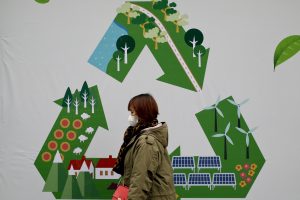As soon as U.S. President Donald Trump threatened to withdraw the United States from the Paris Agreement, a narrative surfaced among the international community: China was to become the “leader” in the global fight against climate change. The word “leader” brings to mind the image of a virtuous hero. One may be quick to dismiss China’s suitability for the role, given its less-than-heroic environmental record. Its economic reforms since the late 1970s may have lifted hundreds of millions out of poverty, yet the speed and scale of environmental destruction has been simultaneously unparalleled.
Much of China’s polluting production has roots abroad, as its cheap labor, land, and lax regulations have attracted bounteous foreign investment. But plenty of China’s pollution is homegrown, coughed out by the coal-fired power plants that fuel the nation’s economic engine, the industries and infrastructure projects that keep the masses working, and the Toyotas and Buicks prized by the mushrooming middle class. Since 2007, China has surpassed the United States as the leading greenhouse gas emitter, responsible for 27 percent of greenhouse gas emissions worldwide. And the late-coming neoliberal behemoth is currently offshoring emissions abroad through its controversial Belt and Road Initiative.
What global leadership could there be to speak of when China’s own environmental track record has been subpar?
As the great mythologist Joseph Campbell has elucidated, a hero is not a selfless martyr, and the hero’s journey is not a morality play. The passage into heroism often starts from a place of grudging reluctance, when a decidedly unheroic figure is thrust into a mighty responsibility they did not seek. This is the familiar story of Hamlet, Frodo, Jon Snow, Katniss Everdeen, and Han Solo. Will it be the story of China in the fight against climate change? Will it ultimately be the story of all the villains of manmade global warming – that is, humanity itself?
The four years since Paris mark the four warmest years in recorded history. The world’s most vulnerable are already being consumed by roaring hurricanes, oppressive heatwaves, burning forests, and creeping sea levels. More than a minority in the scientific community believes that the fight to meet the Paris commitments has already been lost. But for those who still hold onto the possibility of redemption, Paris or not, perhaps a new perspective on leadership is in order.
From this perspective, leadership is not anointed by divine intervention, but ordained by practical necessity. Leadership that confers not status, but responsibility; leadership that is fulfilled not through symbolic rhetoric, but substantive action. This is what the international community is looking for when talking about Chinese leadership following the U.S. withdrawal from Paris. It is a plea for action rather than a heroic accolade. For those who have not yet given up on what China can do (and must do) for the planet, it is helpful to examine both its actions and inactions, where the rhetoric of its climate and environmental leadership meets reality, and where reality falls short of rhetoric.
Like Han Solo, China has been thrust into leading a fight it was not ready for. Can it lead? If so, how?

































